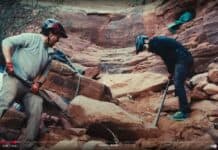On the night of Saturday, Sept. 14, the Lowell Observatory held a special gala event with guest speaker William Shatner at the High Country Conference Center in Flagstaff, with proceeds going to the observatory’s youth camp program.

Shatner — best known for his role as Captain James T. Kirk on the original “Star Trek” series and subsequent films — regaled fans and observatory supporters with a talk about not only the important work being done in astronomy, but also the impact science fiction has on peoples’ lives.
The actor was accompanied by some of his family, including his 8-year-old granddaughter, Natasha, who at one point was overheard saying, “I didn’t know papa was so famous!”
When Shatner took the stage, he warmed up the crowd with a joke directed at Neil Armstrong, who spoke last year at a similar event for the Lowell Observatory.
“One thing I need to clear up, though, very quickly: last year’s guest, Neil Armstrong, claims to be the first man on the moon,” he said before looking at the audience with a frown and then pointing to himself.
Shatner’s speech centered on the impact of space exploration and science fiction, and he started by discussing the potential impact of astronomy on children.
“My grandchildren, whose minds I sort of listen to and think it’s so amazing, how they’re affected by what we do, what we say,” he said. “Who knows what one incident can affect the journey of their life?”
Shatner talked about how just peering into a telescope, like he had Natasha did earlier in the day, can fire up a child’s imagination and set them on the course to studying science.
“The imagination of space. Oooh, the mystery of space tantalizes all of us here. That’s why we’re here,” he said, adding that he was specifically asked to talk about how “Star Trek” affected people and impacted their lives.
Shatner said that it was a good topic, so he used his Twitter account to reach out to Trekkers on social media for their feedback.
“So I twittered,” he said to some laughs from the crowd. “I said to the audience at large, ‘send me some letters about how ‘Star Trek’ affected you when you were younger.’ I got a couple of letters. Actually, more than a couple.”
Shatner had a small stack of letters with him, which he read excerpts from and commented on; each letter spoke to the great impact that “Star Trek” in all its iterations has had on influencing young minds.
“The imagination of space. Oooh, the mystery of space tantalizes all of us here. That’s why we’re here.”
— William Shatner, Actor
“‘If I had anything like a religion, it’s like space is our essential future in order to survive. I think that humanity is worthy of that, and capable of being so much more than we are at the present,’” he quoted from the first letter. “‘What Star Trek really taught me is that mankind must learn tolerance and stop fighting amongst ourselves because there’s an entire universe to explore, and it will be an eternal challenge we need to remain human.’”
Other letters detailed how fans went on to work in the fields of astronomy and aeronautics, with them crediting the TV series with inspiring them to pursue those fields.
Shatner said that the impact wasn’t just felt in the letters. He recounted a story from when he was beginning preliminary work on a documentary with all of the actors who had played captains in the various “Star Trek” shows. He said he had discovered that since the actors were in different parts of the world, the cost of flying his crew to shoot the documentary was more than the entire budget of the documentary.
“So on a wild, crazy inspiration — as it turned out — I called Canada, to Bombardier, Canada’s big airplane manufacturer, and I asked to talk to the CEO. And they put me through,” Shatner said. “I said, ‘Look I’m making a documentary and I need an airplane, can you lend me an airplane?’ And he said yes.
“And I met Stephen Rudolph, who is the CEO of Bombardier, and we talked, and I said, ‘Why did you lend me the airplane?’ And he said, ‘When I watched Star Trek, I became ambitious about going into flight and into flying, and I became an aeronautical engineer; and as an aeronautical engineer at Bombardier I became CEO, and I owe it all to Star Trek.’”
Shatner drew his speech to a close by drawing the connection between science fiction and the work being done by the scientists at Lowell Observatory, explaining that science fiction provides the mythology to explain the great discoveries being made by astronomers.
“It all comes from your imagination, and the extension of your imagination is science fiction,” he said. “And the extension of that is Natasha, looking through the telescope, 8 years old.
“It is the children whose imagination is cultivated by ‘Star Trek,’ and that is the most exciting.”
After the speech, Shatner asked a selection of questions collected from the audience. When asked which episode or film was his favorite from his time doing “Star Trek,” he admitted that he doesn’t have a favorite, mostly due to the fact that he doesn’t like watching himself onscreen.
“I was forced to watch some of the movie I directed [‘Star Trek V: The Final Frontier’], so I was forced to watch that,” he said to laughter from the crowd. “But the actual fact is, I don’t really know.”
After answering a few more questions, Shatner and his family had to call it a night, as it was revealed that their flight — leaving Flagstaff Pullium Airport — was set for 10 p.m. and it was already 9:45 p.m.



















